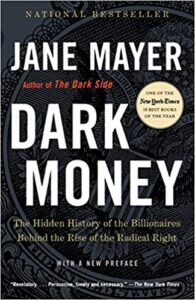#MUSTWATCH
[U.S. Senator Sheldon Whitehouse, Rhode Island, during Judge Amy Coney Barrett’s nomination hearing to the Supreme Court.]
Grab a cup of tea…might need a cocktail. 28:37. Worth every minute. Brilliant. -Dayle
From New Yorker staff writer Jane Mayer and author of the book, Dark Money:
“Amazing exposition of the dark money behind the Supreme Court fight via Sen. Whitehouse.”
Dark Money:
In the politics of the united States, refers to political spending by nonprofit organizations — for example, 501(c)(4) (social welfare) 501(c)(5)(unions) and 501(c)(6) (trade association) groups — that are not required to disclose their donors. Such organizations can receive unlimited donations from corporations, individuals and unions. In this way, their donors can spend funds to influence elections, without voters knowing where the money came from. Dark money first entered politics with Buckley v. Valeo (1976) when the United States Supreme Court laid out Eight Magic Words that define the difference between electioneering and issue advocacy.
According to the Center for Responsive Politics (CRP), spending by organizations that do not disclose their donors has increased from less than $5.2 million in 2006 to well over $300 million in the 2012 presidential cycle and more than $174 million in the 2014 midterms.” The New York Times editorial board has opined that the 2014 midterm elections were influenced by “the greatest wave of secret, special-interest money ever raised in a congressional election.”CRP also noted that the 2010 landmark case, Citizens United v. FEC, marked the turning point when dark money contributions surged, stating “there are other groups now free to spend unrestricted funds advocating the election or defeat of candidates. These groups contend that they are not required to register with the FEC as any sort of PAC because their primary purpose is something other than electoral politics. This spending itself isn’t new. But the use of funds from a virtually unrestricted range of sources, including corporations, began with the most recent court rulings.” [wikipedia]

Leave a Reply